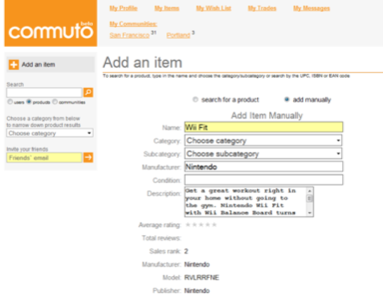Commuto puts an interesting spin on trading real world goods on the Internet. Clearly, it would be extremely hard for any start-up to be successful in this space when the likes of eBay and Craigslist having pretty much become synonymous with online trading already. Commuto, however, doesn’t go head to head with these giants – instead, it focuses on local trades based on bartering.

Trade Locally
In many ways, Commuto reminds me of BookMooch. BookMooch is an international and highly active community for swapping books. Users add books from their library to the system and can trade them for books from other users (or donate them to charities as well). Every user gets a certain number of credits per book, depending on if the book is send overseas or locally.
Commuto takes a very similar approach, but with a focus on trading items locally and instead of a credit system, users have to barter among themselves for what they want to get in return for their items. Commuto only initiates the contact between the two parties. While the text on the site seems to imply that users will mostly swap one item for another, users could also decide on a cash price as well.

Going Global
Commuto does quite a few things right. Adding your own items to the system is as easy as entering a UPC code from the packaging (or just entering the data by hand if you don’t have the packaging with the code anymore). Also, just in the last few days, Comuto expanded outside of the US to most European and South American countries, as well as Israel and Australia.
Unlike Craigslist, Commuto also has a reputation system for its users. This has definitely helped eBay overcome some users’ fears of trading used items with relatively anonymous traders and will surely help Commuto overcome similar fears among its users.
There are currently still a few inconsistencies in the user interface. Why, for example, can’t you add communities under the ‘communities’ tab? Instead, you have to edit your profile. Commuto’s developers have responded quickly to quite a number of problems on the site, though, so I assume that they will fix some of these minor problems pretty quickly as well.

Finding Users
Like a lot of similar products, Commuto is still in its early phase of getting enough users to become useful. Its largest user base is in Los Angeles right now, with just over 600 users, but in San Francisco it only has 31 users so far. Commuto would probably work very well on college campuses (a market they specifically target). Given how compact most campuses are, Commuto would be an ideal system for trading textbooks, CDs, or games.
Commuto’s biggest competitor is most likely Craigslist. Unlike Commuto, a user on Craigslist can assume that a listing is going to be seen by hundreds of people. Commuto also competes with eBay on some levels, but given that its emphasis isn’t so much on making money from trades and more on trading items within a local community, they don’t seem to overlap too much.
Commuto is definitely a service worth checking out, especially if you are trying to set up a marketplace for a relatively compact community like a college campus.

















